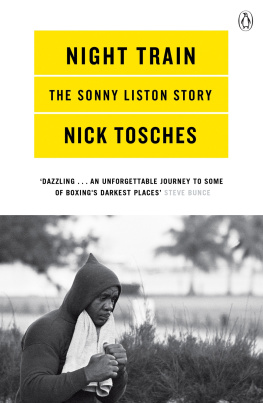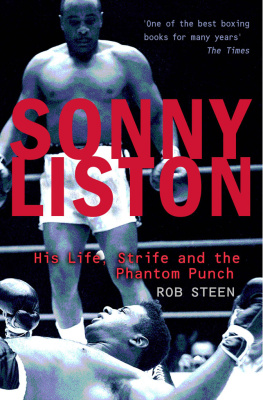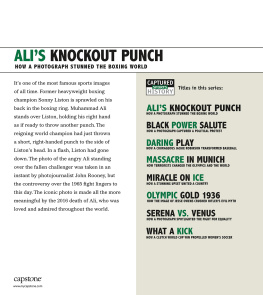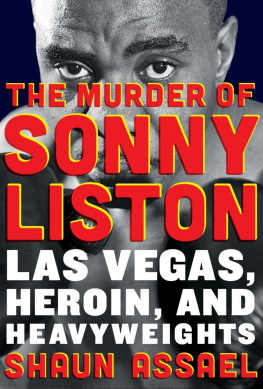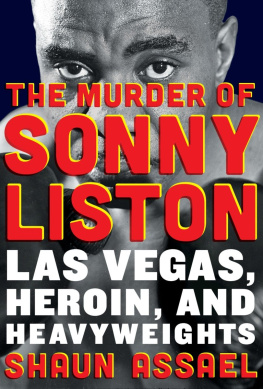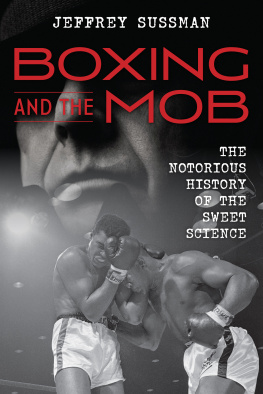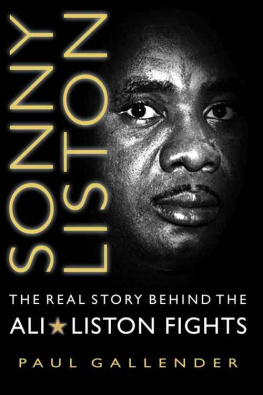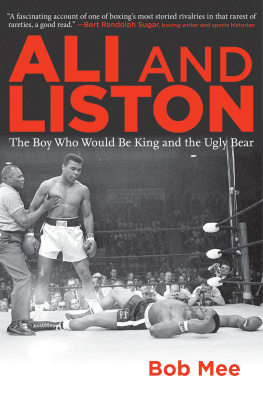Contents
Nick Tosches
NIGHT TRAIN
The Sonny Liston Story
PENGUIN BOOKS
UK | USA | Canada | Ireland | Australia
India | New Zealand | South Africa
Penguin Books is part of the Penguin Random House group of companies whose addresses can be found at global.penguinrandomhouse.com.
First published in the United States of America as The Devil and Sonny Liston by Little, Brown and Company 2000
Published in Great Britain by Hamish Hamilton Ltd 2000
Published in Penguin Books 2001
Copyright Nick Tosches, 2000
All rights reserved
The moral right of the author has been asserted
Cover image Mirrorpix
ISBN: 978-0-241-98240-2
THE BEGINNING
Let the conversation begin
Follow the Penguin Twitter.com@penguinUKbooks
Keep up-to-date with all our stories YouTube.com/penguinbooks
Pin Penguin Books to your Pinterest
Like Penguin Books on Facebook.com/penguinbooks
Listen to Penguin at SoundCloud.com/penguin-books
Find out more about the author and
discover more stories like this at Penguin.co.uk
PENGUIN BOOKS
NIGHT TRAIN
Dazzling, unforgiving Tosches and Liston smash their way through fights, beaten men and dark places Tosches understood the large heart and vicious ways of Liston and together they take an unforgettable journey Steve Bunce, author of Bunces Big Fat Short History of British Boxing
A fantastic book about a life that started in darkness and continued to go deeper into the darkness until the only light was death. Nick Tosches is an extraordinary writer Hubert Selby Jr, author of Requiem for a Dream
Brash and astute Tosches gets in the ring and slugs it out from the first bell as if he were the twin reincarnation of John L. Sullivan and Jack Dempsey. He picks the dirtiest, ugliest, saddest man the fight game has thrown up in a hundred years and rides the story all the way to the grave Observer
Tosches has a talent for getting inside the skin of men and drawing out meaty stories from the denizens of shadowy worlds He gives us a bigger story than that of Sonny Liston, placing him in the context of his time, the corrupt world of boxing in the 1950s and the racial landscape of America Hard, tough writing suited to a hard, tough subject The New York Times Book Review
The fullest portrait yet of this troubled man. Told in the spare, muscular prose Tosches is known for, Listons story is the tale of a man who, as one acquaintance noted, died on the day he was born Esquire
Tosches is a remarkable reporter While Liston demolishes opponents with the brutality of his blows, Tosches goes down the mean streets of professional boxing, ventures into the shadowy corners of mob dealings and dares to reveal the fixed fights Theres a great story here Salon
A hyper-noir meditation on the devil and his relationship to Sonny Liston Tosches has attitude to spare, agile and sublime, smooth and cool A captivating, tragic tale Austin Chronicle
Crackling and unmissable A warped fairy tale and a dark murder mystery Maxim
A profound voyage into the twisted psyche of a sportsman Brings you face to face with a hard life and ugly death FHM
Exhaustive As clear a picture as were likely to get of this enigmatic subject Wall Street Journal
ABOUT THE AUTHOR
Nick Tosches was born in Newark, New Jersey. He is the author of the novels Cut Numbers and Trinities. His non-fiction books include Hellfire and Dino.
TO A BENCH IN THE OLD NEIGHBORHOOD,
AND TO A STAR THAT OVER IT SHONE
IN THE HEAT OF THE SUMMER NIGHT
This is a song
for the one who is doomed,
a blow to the heart that breaks the mind.
SCHYLUS
FROM NOTHING
The corpse was rolled over and lay face down on the metal slab. It was then that the coroner saw them: the copper-colored whipping welts, old and faint, like one might imagine to have been those of a driven slave.
To say that Charles Liston had been a slave would be to render cheap metaphor of the life of a man. And yet those scars on his back were as nothing to deeper scars, the kind that no coroner could ever see, scars of a darkness far less imaginable than those from any lash. Charles Liston, the most formidable of men, the most unconquerable of heavyweight boxers, had been enslaved by the forces of that darkness: enslaved, conquered, and killed by them.
Born with dead mans eyes, he had passed from the darkness of those scars on his back to the darkness of the criminal underworld, to a darkness beyond, a darkness whose final form was the last thing his eyes ever saw.
I remember the figure of Sonny Liston from my boyhood: distant, ominous, enigmatic, alluring. It now strikes me as odd looking back at that boyhood that a black man could have fascinated me so. In 1962, the year that Sonny won the heavyweight title, I was in the eighth grade of P.S. 24 in Jersey City. The school was predominantly black, and intramural racial conflict was the foremost extracurricular activity. There were skirmishes every day, full-blown gang fights every Friday afternoon: black against white, white against black. The mutual hostility had always been there, but in the fall, winter, and spring of 19623, the brew of that hostility boiled over. Friendship between black and white was driven underground, or ended. The punishment for consorting with the enemy was to be beaten, damned, persecuted, and ostracized, not only by ones own kind but by the enemys kind as well. To black and white alike, such behavior was contra naturam, an assault and a crime against all that was as it should be.
At this same time, LeRoi Jones was writing a novel about the evil spirit of those days. In The System of Dantes Hell, published in 1965, it was as if Jones, setting out to exorcise evil, was overtaken by it, and his book emerged as one of the most powerful and beautiful expressions of blind hatred and its wages since the Pentateuch. The hell he chose in which to set his story was the city of Newark, where he had his roots, and where I was born and partly raised. I must have read the paperback in 1966, and I was in Newark in the summer of 1967 the Summer of Love, those hippie assholes called it when the riots flared. For me, it was like the force of Joness vision erupting from the underworld regions through the streets. I loved it. It had nothing to do with black and white, it merely was: an emanation of all that destroys us from within, wild and deadly and beyond the lie of law. I remember the old Jewish shopkeepers fleeing, painting the words SOUL BROTHER on their storefront windows, in the vain hope that their enterprise would be perceived as black and therefore spared.

